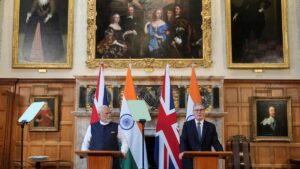Context:

Relations between India and the United Kingdom (U.K.) are deepening with the anticipated signing of the India–U.K. Comprehensive Economic and Trade Agreement (CETA). The visit of British Prime Minister Keir Starmer marks a crucial step in strengthening bilateral cooperation, economic integration, and geopolitical alignment in a rapidly changing global order.
Key Highlights / Details:
- Evolution of India–U.K. Ties:
- The India–U.K. relationship has transformed from a historical association to a strategic economic partnership.
- The CETA, which has been under negotiation since July 2022, is expected to serve as the foundation of long-term cooperation.
- The agreement aims to:
- Remove trade barriers and expand market access,
- Strengthen collaboration in investment, innovation, and education,
- Foster mobility and employment opportunities for professionals.
- Focus Areas of the Trade Agreement (CETA):
- Goods and Services Trade: CETA will liberalize trade across sectors such as pharmaceuticals, automobiles, machinery, and IT services.
- Investment and Mobility: The U.K. seeks smoother access for British companies and skilled workers, while India emphasizes services mobility and technology partnerships.
- Intellectual Property and Regulatory Alignment: Both nations aim to balance protection with innovation, facilitating mutual growth.
- Digital and Clean Technology Collaboration: Cooperation on AI, quantum computing, clean energy, semiconductors, and climate resilience is being institutionalized.
- Broader Strategic Alignment:
- The CETA complements the Migration and Mobility Partnership and the Double Taxation Avoidance Convention, improving the movement of professionals and investments.
- India and the U.K. are aligning within frameworks like:
- India–U.K. Roadmap 2030,
- India–U.K. Defence and Security Partnership, and
- G20 and Commonwealth platforms.
- The growing convergence on Indo-Pacific stability, maritime security, and supply chain diversification underscores the geopolitical significance of this relationship.
- Economic and Strategic Benefits:
- For India, the U.K. offers a gateway to European markets, advanced technology, and green investment.
- For the U.K., India represents a vast consumer base, a skilled workforce, and a key geopolitical ally in the Indo-Pacific.
- The deal also strengthens people-to-people linkages — education, startups, and innovation ecosystems.
- Challenges and Way Forward:
- Sensitive sectors such as agriculture, automobiles, and professional visa regulations remain negotiation hurdles.
- Continuous dialogue and trust-building are essential to create a balanced, equitable framework that benefits both economies.
- The CETA’s successful conclusion could make it India’s most comprehensive trade pact with a developed country, boosting global investor confidence.
Relevant Prelims Points:
- India–U.K. Comprehensive Economic and Trade Agreement (CETA):
- Aims to enhance bilateral trade beyond the $20 billion mark.
- Negotiations began in 2022 and focus on reducing tariffs and promoting investment and services trade.
- India–U.K. Roadmap 2030: Framework to enhance cooperation in health, climate, trade, defence, and education.
- Trade Fact: The U.K. is India’s 6th largest trading partner (2024–25), accounting for nearly 2% of India’s total trade.




